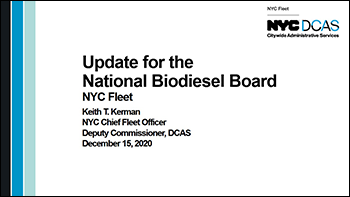The wealth of information available to today’s energy professionals can seem overwhelming at times. With so much coming at you at once, where should you direct your attention? Each issue, energy.ink’s Data Dive features one informational report, study or survey worthy of closer inspection.
 Sometimes the data’s all right in front of you, but it takes a deep dive to extract the key points. Other times the key points might be obvious, but it takes a deep dive to find the data in the first place. This would one of the latter occasions.
Sometimes the data’s all right in front of you, but it takes a deep dive to extract the key points. Other times the key points might be obvious, but it takes a deep dive to find the data in the first place. This would one of the latter occasions.
On December 15, 2020 the New York City Department of Citywide Administrative Services (DCAS) — the government agency charged with overseeing the largest municipal fleet in the country and the second largest in the world — presented an update to the National Biodiesel Board on the City’s use of biodiesel, renewable diesel and Bioheat® fuel.
The report contains a number of impressive statistics documenting New York City’s efforts to reduce emissions by adopting higher blends of biofuels. But to find the report, one would need to visit the DCAS website, then head to the NYC Fleet section, then click on “Fleet News” and then navigate to the newsletters and announcements posted in December 2020. Talk about a deep dive!
We’ve saved you the trouble. The full report can be downloaded here. Some key takeaways are below:
- NYC Fleet used 9.4 million gallons of biodiesel blends in 2012, the vast majority of which (8.8 million gallons) was B5.
- Last year, NYC Fleet’s annual biodiesel consumption reached 13.3 million gallons, about half of which (6.6 million gallons) was B20
- NYC municipal buildings used 20.4 million gallons of Bioheat fuel blends in 2020, 7.0 million of which was B10.
- Altogether NYC government buildings, vehicles and fleet equipment used 33.7 million gallons of biodiesel blends in 2020.
- From 2013 to 2020, NYC government buildings, vehicles and fleet equipment used 339.2 million gallons of biodiesel blends (222.9 million for buildings and 116.3 million for fleet).
That’s a lot of gallons! And while the city aims to fully electrify its fleet by 2040, case studies show that other advanced biofuels like renewable diesel can help reduce emissions from transportation and buildings immediately. Links to several of these studies can be found in the report above, so take a look. If you operate anywhere in the biofuel supply chain, you should like what you see.
